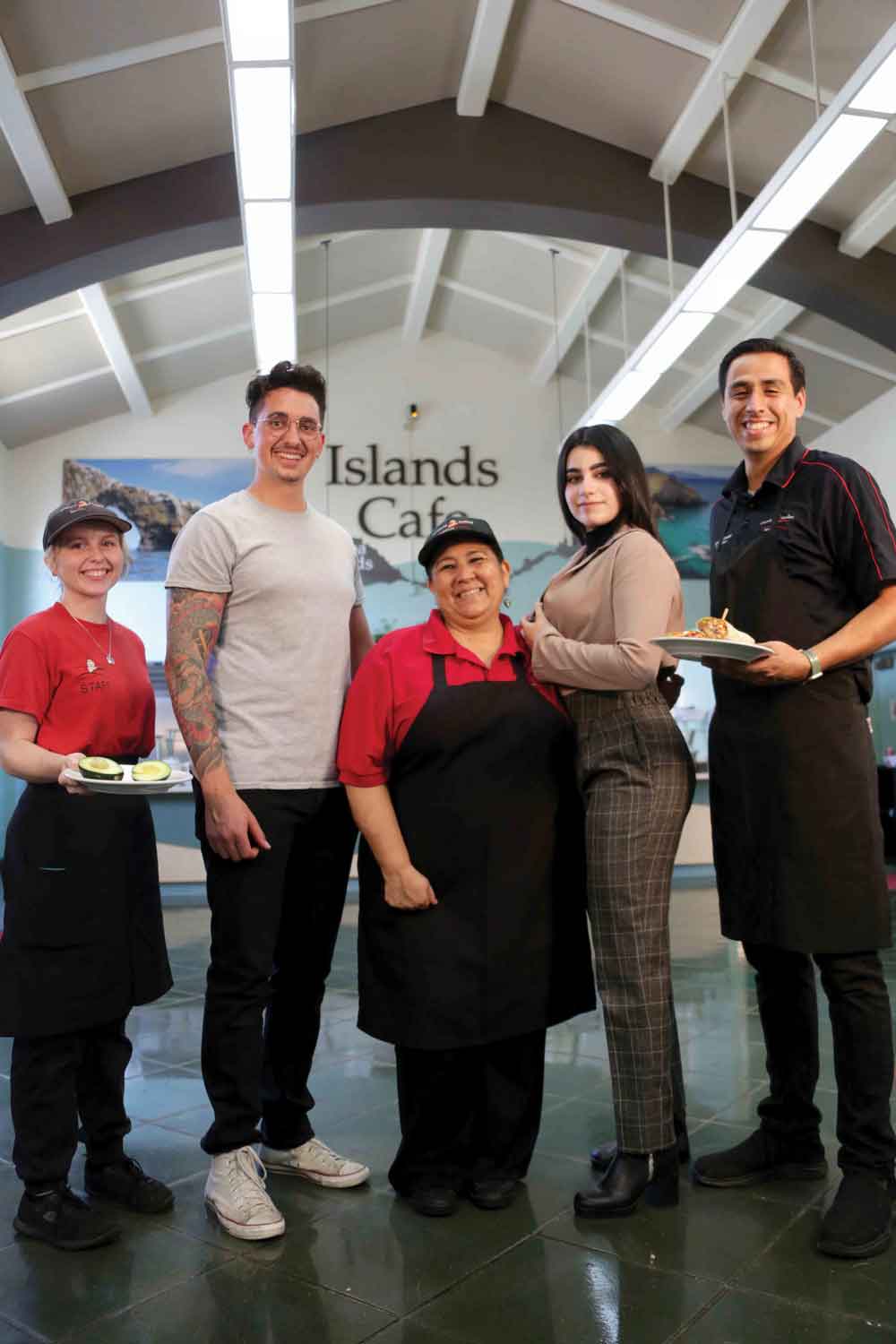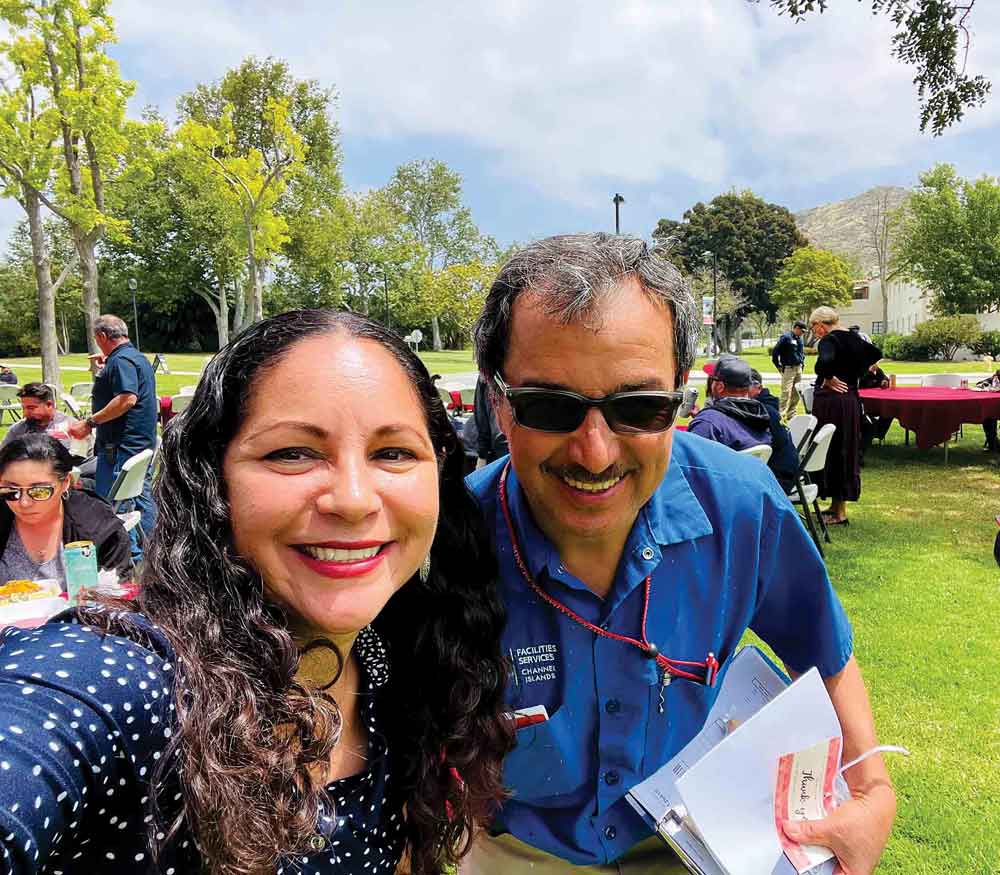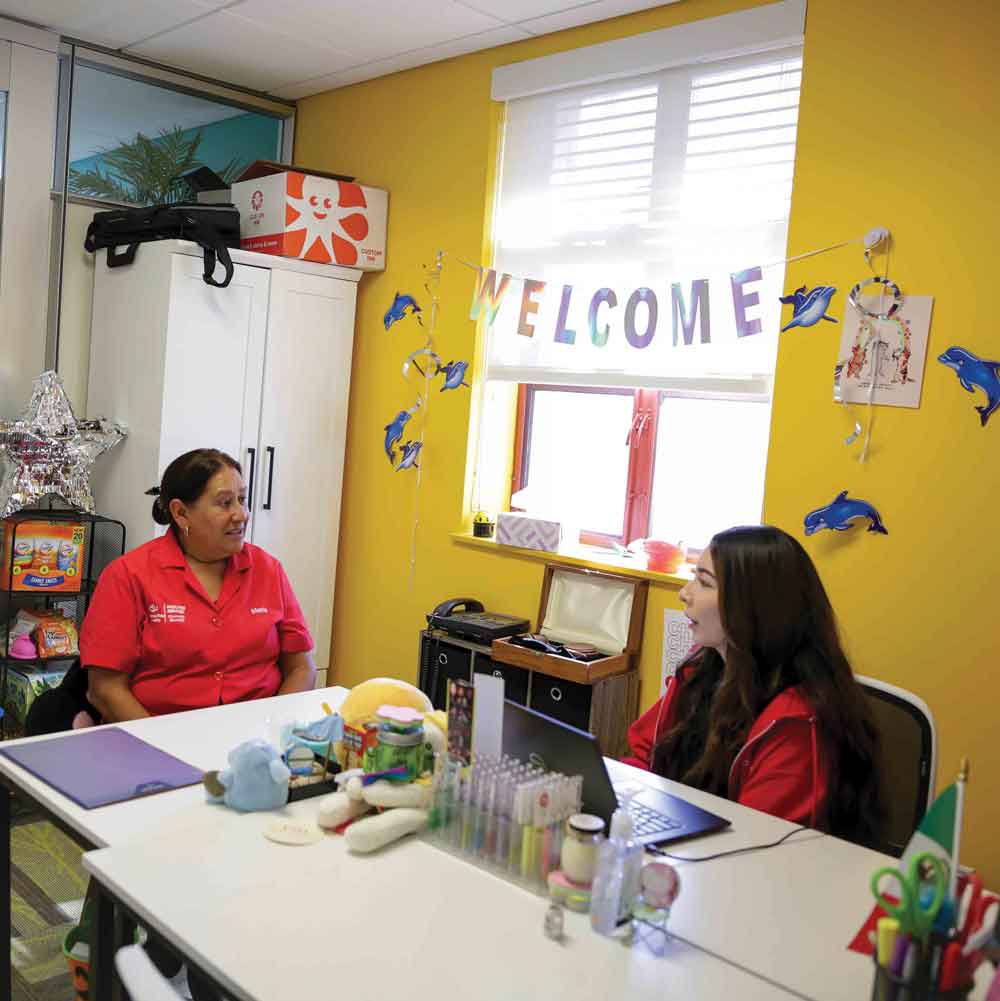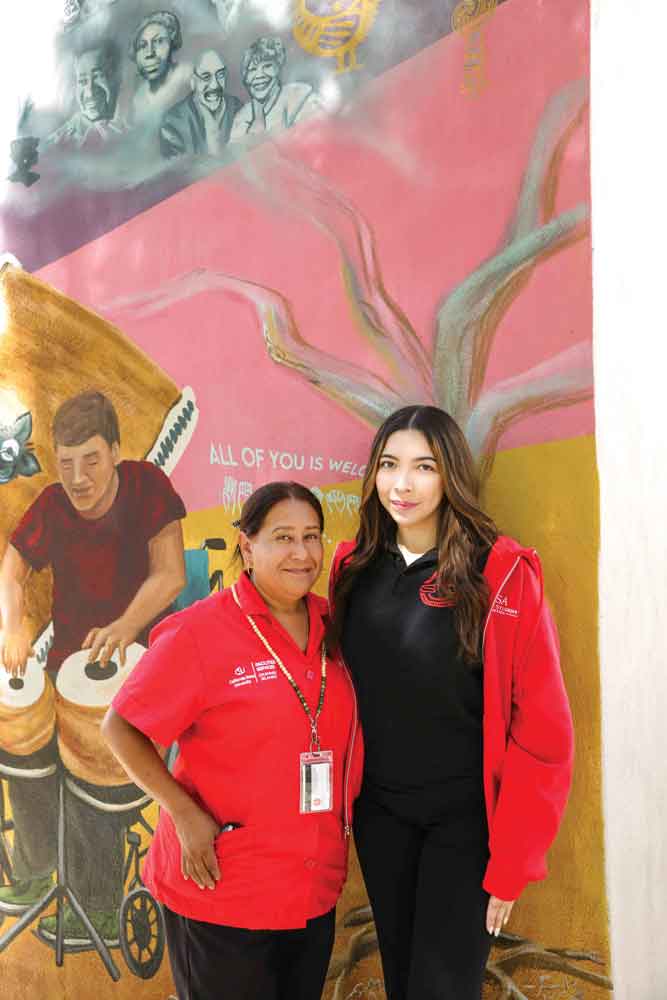Connections with custodians and food service workers help students succeed.
By Karin GrennanStarting his fifth and final year at CSUCI in August, Spencer Mack faced life on campus without his girlfriend and most of his friends for the first time because they had graduated. But if he ever wanted to chat with a friend, he knew he could find one behind the deli counter at Islands Café, where Silvia Valencia has been serving up sandwiches with a side of support for 14 years.
“She’s always been there, every semester,” said Mack, a Mathematics major from Temecula. “She’d always ask me how I’m doing and stuff, and I ask her how she’s doing.”

Islands Cafe employee Kennedy Jones, mathematics student Spencer Mack, Islands Cafe employee Silvia Valencia with her daughter and ʼ23 alumna Yolanda Amador, and Islands Cafe employee Jonathan Amador.
Students often connect with the campus service workers they see regularly, particularly those who feed them and clean their spaces.
“Sometimes they are seen as just manual laborers,” said Associate Professor of English Georgina Guzmán. “But they are actually indispensable frontline staff. They are right there on the frontlines checking on students on an everyday basis.”
That connection can be even more important for students who are the first generation in their families to attend college, Guzmán said. It helps when campus service workers are the same ethnicity as students’ family members, speak the language they hear at home, and have jobs similar to those of their parents.
“When first-year first-generation students come to college, they feel alone, maybe alienated,” Guzman said. “It’s really the dining hall staff, campus custodians and housekeepers who serve as a bridge between their home environment and university environment and help these students feel at ease, comfortable and like they belong.”
 Associate Professor of English Georgina Guzmán with Facilities Project Supervisor Rogelio Mendoza at Campus Workersʼ Day Luncheon.
Associate Professor of English Georgina Guzmán with Facilities Project Supervisor Rogelio Mendoza at Campus Workersʼ Day Luncheon.
Guzmán knows from experience. A first-generation college student, she was excited to leave her working-class immigrant Latino neighborhood and live and study with other high-achieving students at UCLA. But she was negatively judged as a minority by competitive students, and service workers often were the only ones who spoke to or ate with her.
“I wanted to go back home, but when I would talk to the housekeeping staff and the women in the dining halls, I felt they served as kind of parental figures for me and they gave me that support that I needed,” Guzman recalled. “I could allow myself to be vulnerable with the staff.”
Twenty years later, when Guzmán began writing her memoir during the COVID-19 pandemic, she realized these people provided one of the main reasons she stayed in college. Checking with colleagues who were first-generation college students, she discovered campus service workers helped them all get to graduation, yet nothing had been written about it.
“It’s really the dining hall staff, campus custodians and housekeepers who serve as a bridge between their home environment and university environment and help these students feel at ease, comfortable and like they belong.”
—Georgina Guzmán
“We said, 'We need to compile our stories,’” Guzmán said. “Nobody ever talks about this.”
The result was the 2022 book Campus Service Workers Supporting First Generation Students: Informal Mentorship and Culturally Relevant Support as Key to Student Retention and Success. Guzmán and co-editors La‘Tonya Rease Miles, Dean of Student Affairs at Menlo College, and Stephanie Santos Youngblood, a former program director at UCLA, selected the 23 chapters from about 50 submissions.
Guzmán wrote a chapter about how her experiences at UCLA led her to value her family more, get involved in social justice efforts and eventually teach at a federally designated Hispanic-Serving Institution where she helps other first-generation college students embrace their backgrounds.
A chapter by Jennie Luna, an Associate Professor of Chicana/o Studies at CSUCI, talks about how Black and Latino security and custodial staff members were her first friends in graduate school and how CSUCI Custodian Rubicela Tafolla Morada became a comforting and trusted confidant while cleaning her office.
 Custodian Maria Miranda visits with Student Government President Daisy Navarrete.
Custodian Maria Miranda visits with Student Government President Daisy Navarrete.
Nancy-Jean Pément, an Educational Leadership Lecturer at CSUCI, wrote about how the cultural pride of her father, a man of mixed Indigenous and québécois heritage who was a machinist at her alma mater, influenced her journey to teach first-generation, linguistically-minoritized, working-class students from historically marginalized groups.
The informal support and mentorship detailed in the book plays out across the CSUCI campus every day. Valencia, affectionately known as ‘Silvia the Sandwich Lady,’ is a perfect example, Guzmán said.
Valencia had been training as a social worker in Mexico City before she immigrated to California at 18. After working in the fields and in catering, Valencia put to work her talent for helping people and her desire to see the next generation succeed at CSUCI. The Oxnard resident treats students the way she wants people to treat her children, who now range in age from 22 to 40 and make her proud.
“I know in my heart that I love the students,” Valencia said. “I care about them.”
When she notices they are acting differently, she asks if something is wrong. They tell her when they are tired, or sad, or having problems with a significant other.
“I discovered that the students, especially the girls, are very insecure. So, I tell them the things that I want others to say to my four daughters, like, 'You are pretty,'" said Valencia, whose youngest daughter, Yolanda Amador, graduated from CSUCI in May with a bachelor’s degree in Psychology. “I tell the girls, ‘'Mija,' don’t you see what you have? ... You need to accept what you have and accept you. If you don’t accept you, who is going to accept you?’ I always try to be positive with them.”
Valencia and Custodian Maria Miranda showered first-generation college student Giovanni Rojas ’23 with encouragement, support and advice throughout his time at CSUCI, often in Spanish. Seeing the women work hard motivated him to do the same as he pursued a double major in Business and Psychology and a minor in Communication.
“Maybe they’ve filled in for some of the conversations I would have had with my actual mother, but I didn’t get the chance to have because I would always be in school and working.”
—Giovanni Rojas
“They have that familial type of vibe. I relate it to a 'tia,’ an aunt, giving you that type of advice, not just from a Hispanic point of view but also from a mother’s perspective,” the Los Angeles resident said. “Maybe they’ve filled in for some of the conversations I would have had with my actual mother, but I didn’t get the chance to have because I would always be in school and working.”
When first-generation college student Daisy Navarrete began her term as Student Government President in June, she quickly got to know Miranda, who did much more than clean her office in the Student Union.
 Maria Miranda and Daisy Navarrete
Maria Miranda and Daisy Navarrete
“She’s always saying, ‘Good morning,’ to me. She speaks Spanish, so I’m always practicing my Spanish with her,’” said Navarrete, a Health Science major from Oxnard. “It’s like a piece of home here.”
After the book was published, Guzmán helped organize a Campus Service Workersʼ May Day Luncheon to formally acknowledge their contributions and thank them.
To thank Valencia, Mack launched a GoFundMe campaign for her in Fall 2022. He raised more than $600 from 34 donors, mostly students, and presented it to her after one of her shifts.
“She’s been a big part of my college life. She’s given a lot to me,” Mack said. “I wanted to show her that she has more of an impact than she might think that she does.”
